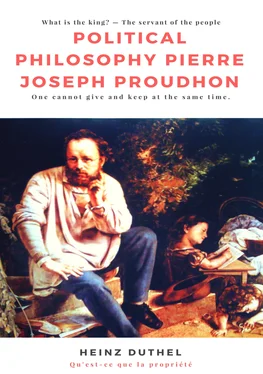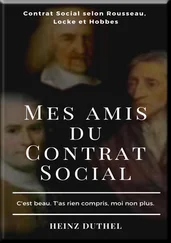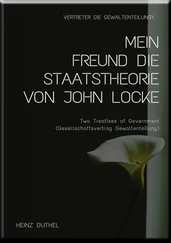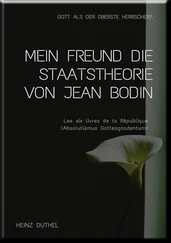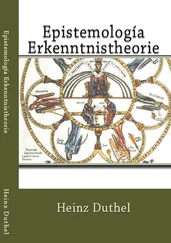But what is there in man older and deeper than the religious sentiment?
There is man himself; that is, volition and conscience, free-will and law, eternally antagonistic. Man is at war with himself: why?
"Man," say the theologians, "transgressed in the beginning; our race is guilty of an ancient offence. For this transgression humanity has fallen; error and ignorance have become its sustenance. Read history, you will find universal proof of this necessity for evil in the permanent misery of nations. Man suffers and always will suffer; his disease is hereditary and constitutional. Use palliatives, employ emollients; there is no remedy."
Nor is this argument peculiar to the theologians; we find it expressed in equivalent language in the philosophical writings of the materialists, believers in infinite perfectibility. Destutt de Tracy teaches formally that poverty, crime, and war are the inevitable conditions of our social state; necessary evils, against which it would be folly to revolt. So, call it necessity of evil or original depravity, it is at bottom the same philosophy.
"The first man transgressed." If the votaries of the Bible interpreted it faithfully, they would say: man originally transgressed, that is, made a mistake; for to transgress, to fail, to make a mistake, all mean the same thing.
"The consequences of Adam's transgression are inherited by the race; the first is ignorance." Truly, the race, like the individual, is born ignorant; but, in regard to a multitude of questions, even in the moral and political spheres, this ignorance of the race has been dispelled: who says that it will not depart altogether? Mankind makes continual progress toward truth, and light ever triumphs over darkness. Our disease is not, then, absolutely incurable, and the theory of the theologians is worse than inadequate; it is ridiculous, since it is reducible to this tautology: "Man errs, because he errs." While the true statement is this: "Man errs, because he learns."
Now, if man arrives at a knowledge of all that he needs to know, it is reasonable to believe that, ceasing to err, he will cease to suffer.
But if we question the doctors as to this law, said to be engraved upon the heart of man, we shall immediately see that they dispute about a matter of which they know nothing; that, concerning the most important questions, there are almost as many opinions as authors; that we find no two agreeing as to the best form of government, the principle of authority, and the nature of right; that all sail hap-hazard upon a shoreless and bottomless sea, abandoned to the guidance of their private opinions which they modestly take to be right reason. And, in view of this medley of contradictory opinions, we say: "The object of our investigations is the law, the determination of the social principle. Now, the politicians, that is, the social scientists, do not understand each other; then the error lies in themselves; and, as every error has a reality for its object, we must look in their books to find the truth which they have unconsciously deposited there."
Now, of what do the lawyers and the publicists treat? Of justice, equity, liberty, natural law, civil laws, &c. But what is justice? What is its principle, its character, its formula? To this question our doctors evidently have no reply; for otherwise their science, starting with a principle clear and well defined, would quit the region of probabilities, and all disputes would end.
What is justice? The theologians answer: "All justice comes from God." That is true; but we know no more than before.
The philosophers ought to be better informed: they have argued so much about justice and injustice! Unhappily, an examination proves that their knowledge amounts to nothing, and that with them — as with the savages whose every prayer to the sun is simply O! O! — it is a cry of admiration, love, and enthusiasm; but who does not know that the sun attaches little meaning to the interjection O! That is exactly our position toward the philosophers in regard to justice. Justice, they say, is a daughter of Heaven; a light which illumines every man that comes into the world; the most beautiful prerogative of our nature; that which distinguishes us from the beasts and likens us to God — and a thousand other similar things. What, I ask, does this pious litany amount to? To the prayer of the savages: O!
All the most reasonable teachings of human wisdom concerning justice are summed up in that famous adage: Do unto others that which you would that others should do unto you; Do not unto others that which you would not that others should do unto you. But this rule of moral practice is unscientific: what have I a right to wish that others should do or not do to me? It is of no use to tell me that my duty is equal to my right, unless I am told at the same time what my right is.
Let us try to arrive at something more precise and positive.
Justice is the central star which governs societies, the pole around which the political world revolves, the principle and the regulator of all transactions. Nothing takes place between men save in the name of right; nothing without the invocation of justice. Justice is not the work of the law: on the contrary, the law is only a declaration and application of justice in all circumstances where men are liable to come in contact. If, then, the idea that we form of justice and right were ill-defined, if it were imperfect or even false, it is clear that all our legislative applications would be wrong, our institutions vicious, our politics erroneous: consequently there would be disorder and social chaos.
This hypothesis of the perversion of justice in our minds, and, as a necessary result, in our acts, becomes a demonstrated fact when it is shown that the opinions of men have not borne a constant relation to the notion of justice and its applications; that at different periods they have undergone modifications: in a word, that there has been progress in ideas. Now, that is what history proves by the most overwhelming testimony.
Eighteen Hundred years ago, the world, under the rule of the Caesars, exhausted itself in slavery, superstition, and voluptuousness. The people — intoxicated and, as it were, stupefied by their long-continued orgies — had lost the very notion of right and duty: war and dissipation by turns swept them away; usury and the labor of machines (that is of slaves), by depriving them of the means of subsistence, hindered them from continuing the species. Barbarism sprang up again, in a hideous form, from this mass of corruption, and spread like a devouring leprosy over the depopulated provinces. The wise foresaw the downfall of the empire, but could devise no remedy. What could they think indeed? To save this old society it would have been necessary to change the objects of public esteem and veneration, and to abolish the rights affirmed by a justice purely secular; they said: "Rome has conquered through her politics and her gods; any change in theology and public opinion would be folly and sacrilege. Rome, merciful toward conquered nations, though binding them in chains, spared their lives; slaves are the most fertile source of her wealth; freedom of the nations would be the negation of her rights and the ruin of her finances. Rome, in fact, enveloped in the pleasures and gorged with the spoils of the universe, is kept alive by victory and government; her luxury and her pleasures are the price of her conquests: she can neither abdicate nor dispossess herself." Thus Rome had the facts and the law on her side. Her pretensions were justified by universal custom and the law of nations. Her institutions were based upon idolatry in religion, slavery in the State, and epicurism in private life; to touch those was to shake society to its foundations, and, to use our modern expression, to open the abyss of revolutions. So the idea occurred to no one; and yet humanity was dying in blood and luxury.
Читать дальше
